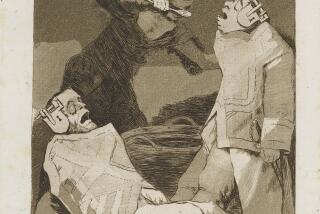He’s a Beast, but He’s Their Beast
- Share via
Years ago, as he was honing the skills of assassin and thug that would enable him to seize power in Iraq, Saddam Hussein invited Baath Party colleagues to see his library. They were shocked to find it was filled with books about Josef Stalin. The Soviet dictator, Hussein explained, was his hero and role model.
Today, Stalin’s story can teach us a lot, not only about the nature of Hussein’s totalitarian rule but also about the ways in which such rule can, paradoxically, elicit genuine allegiance -- the kind for which some citizens may be willing to die. This allegiance -- as much as coercion or fear -- may explain why some Iraqi soldiers have been willing to face almost certain death by confronting our vastly more powerful troops.
The Soviet dictator ruled through absolute terror. A comment about Stalin’s mustache could provoke arrest, imprisonment and death. So could no comment at all. It was this unpredictability and arbitrariness that was at the heart of the terror. And it was with this unpredictability and arbitrariness that Stalin murdered at least 10 million of his countrymen.
Yet when Stalin died, the Soviet people truly mourned. Beastly though he was, he was their beast. They had the sense that, during World War II, he had saved them during their hour of need; they even fought for him.
Though life was uncertain under his brutal rule, his rule was not. Even with his iron fist, he was always there, for some reassuringly so: in photos, statues, edicts, radio messages. All things good -- military and technological achievements, harvests, factories, consumer goods, jobs, national spirit, protection from enemies and from want -- came from him.
It’s hardly surprising, then, that Stalin’s death in 1953 brought immense and genuine grief.
The Soviet dissident Vladimir Bukovsky, in his 1979 memoir “To Build a Castle,” recalled the extraordinary scene in Moscow when he was 10 years old:
“Stalin’s death shook our life to its foundations. Classes virtually came to a halt, the teachers wept openly.... One man shouted from a window of the eye hospital in a sobbing voice: ‘Stalin’s dead and I’m here!’ The rows and fights in the yard stopped too, and enormous unorganized crowds streamed through the streets to the Hall of Columns, where Stalin lay in state. There was something awe-inspiring about these immense, silent, gloomy masses of people.... This vast procession continued on for several days and thousands of people perished in the crush.... On the day of Stalin’s funeral, factory sirens shrieked and wailed and cars and locomotives hooted. Something terrible and irreparable had occurred. How would we live from now on? Our Father, to whom have you abandoned us? People said quite openly: ‘Who is there to die for now? Malenkov? No, the people won’t die for Malenkov!’ ”
Yes, people would have died for Stalin, even those who lost family members in Stalin’s purges.
However terrible a father he had been, he was the only father they had known. Through all the terror, through the mass death and privations of World War II, he was the symbol of authority, the ultimate protector, the source of all sustenance because all power was in his hands. He had been their supreme leader, and father, for 24 years.
Which is how long Hussein has been Iraq’s supreme leader -- and, yes, father. Since his seizure of power in 1979, Hussein’s authority has been total. His image, his words, his presence have become part of the mental reality of every Iraqi.
In Iraq, everything comes from Hussein, not only what is painful but also what is good. Protection from enemies and privation comes from Hussein, even if the enemies and privation were also brought on by Hussein. Food comes from Hussein. Life itself, for many Iraqis, comes from Hussein.
Is it surprising that some Iraqis, perhaps many, would die for him?
How long will such filial devotion last? In the Soviet Union, it lingered after Stalin’s death, even after Nikita Khrushchev denounced him three years later. Some of it has returned. Russians still meet to pine for his glorious rule on the anniversary of his death.
What succeeds Hussein will probably be very different from what succeeded Stalin in the Soviet Union. But what’s relevant and crucial now, as our forces engage Iraq’s, is that a significant number of Iraqis identify with Hussein, and identify him with their country. This makes no moral or logical sense but, for many, it makes emotional sense.
True, most Shiites and Kurds hate him and wouldn’t fight for him; but other Iraqis would and do. That we thought almost none would was a failure of our capacity for psychological imagination.
Hussein’s defeat will change most of this, and probably quickly if the defeat is total enough -- if it removes all vestiges of his power, including the people and institutions that enabled him to rule. But until that defeat comes, our forces will continue to be confronted by at least some Iraqis fighting for Hussein -- less because they’re being coerced into doing so than because he’s the source of life as they know it, however terrible and twisted he has caused it to be.
*
Walter Reich, a psychiatrist, is a professor of international affairs, ethics and human behavior at George Washington University and a senior scholar at the Woodrow Wilson Center.
More to Read
Sign up for Essential California
The most important California stories and recommendations in your inbox every morning.
You may occasionally receive promotional content from the Los Angeles Times.










